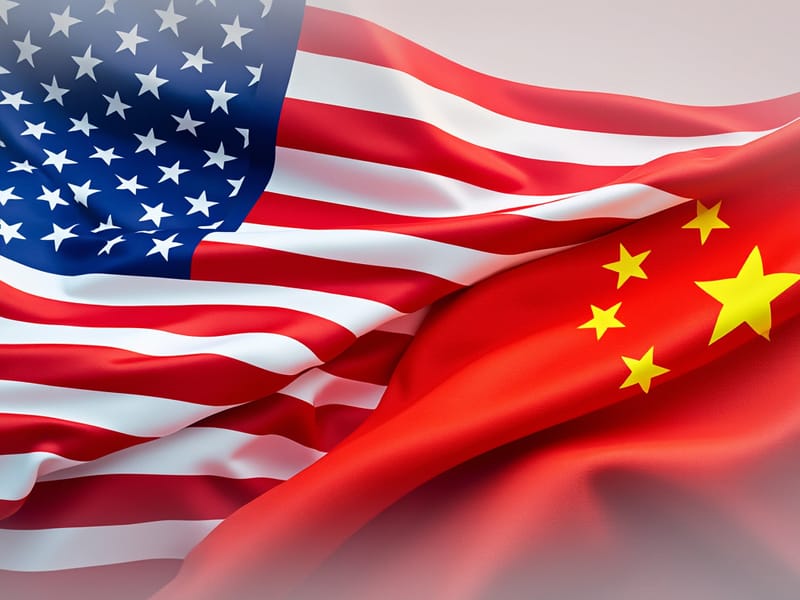U.S. Raises China Tariffs to 125% Amid Escalating Trade Tensions
AOC Calls for Mandatory Stock Disclosure as Economic Policies Spark Congressional Debate Washington, D.C.- In a bold move that has reignited debates over global trade, the United States announced today a staggering increase in tariffs on Chinese goods, raising them to an unprecedented 125%. The decision, unveiled by
AOC Calls for Mandatory Stock Disclosure as Economic Policies Spark Congressional Debate
Washington, D.C.- In a bold move that has reignited debates over global trade, the United States announced today a staggering increase in tariffs on Chinese goods, raising them to an unprecedented 125%. The decision, unveiled by the Trump administration early Wednesday morning, aims to counter what officials describe as unfair trade practices and protect American industries from an influx of subsidized imports. This escalation marks a significant shift in U.S.-China economic relations, drawing sharp reactions from lawmakers, business leaders, and international markets.
The tariff hike comes amid growing concerns over China’s advancements in key sectors like biotechnology and manufacturing, areas where the U.S. has historically held a competitive edge. Administration officials argue that the measure is necessary to safeguard national security and economic sovereignty, citing reports that highlight China’s rapid gains in strategic industries. “We cannot allow our leadership in innovation and production to slip away,” a senior trade official stated during a press briefing. “This is about leveling the playing field.”
NEW TRUTH SOCIAL FROM PRESIDENT TRUMP:
— The White House (@WhiteHouse) April 9, 2025
🇨🇳125% TARIFF ON CHINA
🌎90-DAY PAUSE & LOWERED 10% RECIPROCAL TARIFF FOR OTHER COUNTRIES
🚨EFFECTIVE IMMEDIATELY pic.twitter.com/Gt5Bd6276m
However, the decision has not been without controversy. Critics warn that such aggressive tariffs could trigger retaliatory measures from Beijing, potentially disrupting supply chains and raising costs for American consumers. Small business owners and economists have expressed unease, noting that previous tariff wars led to mixed results, with some domestic industries benefiting while others faced higher input costs. Global stock markets dipped in early trading as investors braced for uncertainty.
On Capitol Hill, the tariff announcement has fueled an unrelated but equally heated debate. Representative Alexandria Ocasio-Cortez (D-NY), a vocal progressive, seized the moment to renew her push for mandatory stock disclosure laws targeting lawmakers and corporate executives. In a fiery speech on the House floor, AOC argued that the tariff decision underscores the need for transparency in how economic policies intersect with personal financial interests. “If we’re making decisions that move markets and affect millions of lives, the American people deserve to know who’s profiting,” she declared.
AOC’s demand comes amid trending discussions online about the influence of personal gain in politics, with some pointing to recent shifts in public figures’ political stances as evidence of self-interest over ideology. Her proposal would require all members of Congress, their immediate families, and top corporate leaders to disclose their stock holdings and trades in real time—a move she claims would restore public trust amid polarizing economic policies like the tariff hike.
After China retaliated with 84% tariffs on U.S. goods, Trump has increased the tariffs on China from 104% to 125%. pic.twitter.com/sCJx5spXR5
— Pop Base (@PopBase) April 9, 2025
Reactions to AOC’s call have been mixed. Supporters praise her focus on accountability, while opponents, including some Republican lawmakers, dismiss it as political grandstanding. “This is just another distraction from the real issues—like how these tariffs are going to hurt working families,” said one GOP representative, speaking anonymously.
Any member of Congress who purchased stocks in the last 48 hours should probably disclose that now.
— Alexandria Ocasio-Cortez (@AOC) April 10, 2025
I’ve been hearing some interesting chatter on the floor.
Disclosure deadline is May 15th. We’re about to learn a few things.
It’s time to ban insider trading in Congress. https://t.co/YBKMGbraAu
As the tariff increase takes effect, its ripple effects are already being felt. China’s foreign ministry issued a statement condemning the move as “economic coercion” and hinted at countermeasures, though specifics remain unclear. Meanwhile, U.S. businesses are scrambling to assess the impact, with some biotech firms expressing cautious optimism that the tariffs could bolster domestic innovation if paired with federal investment.




